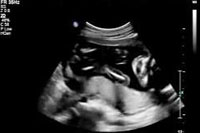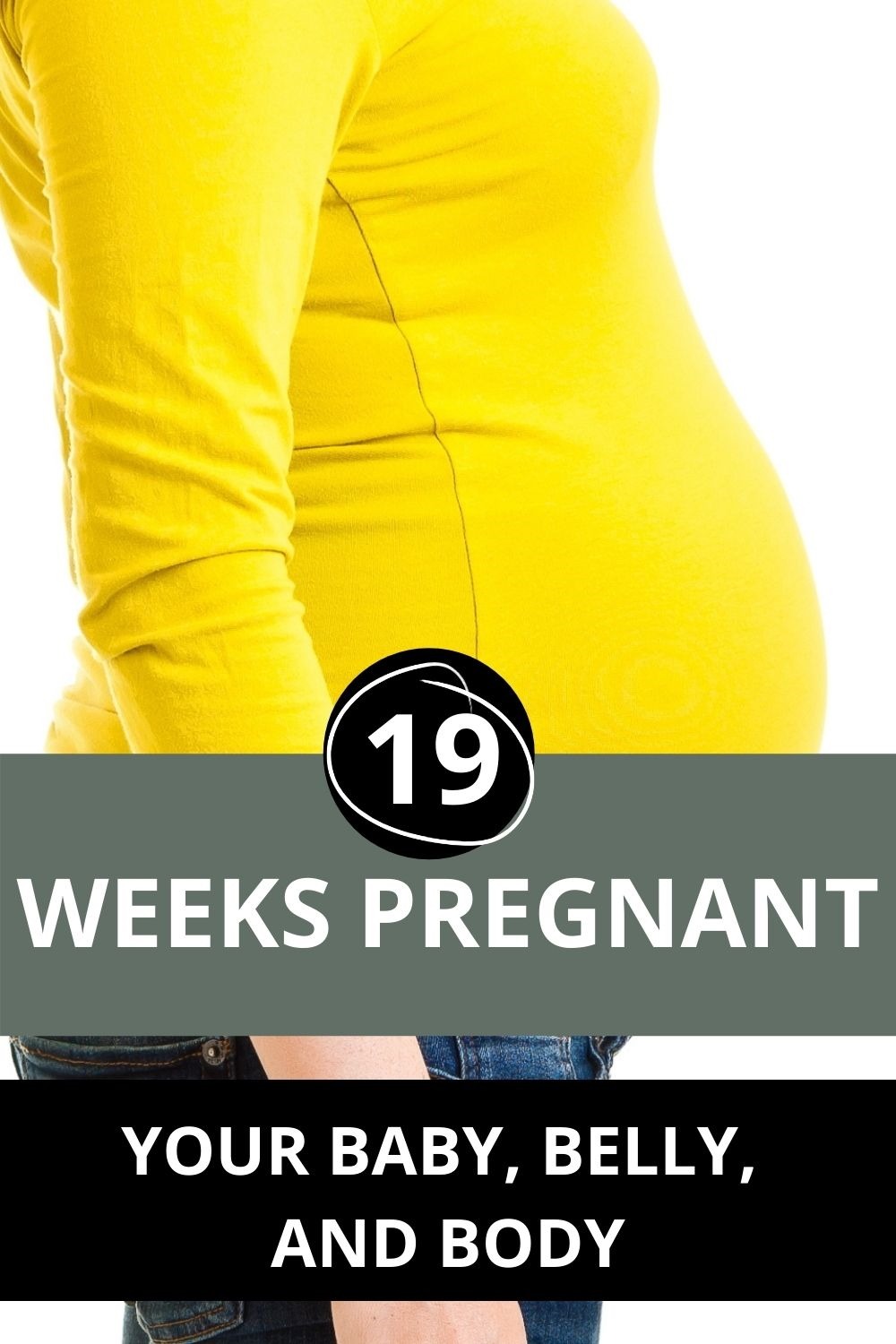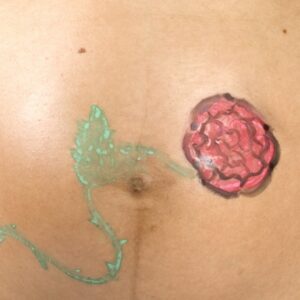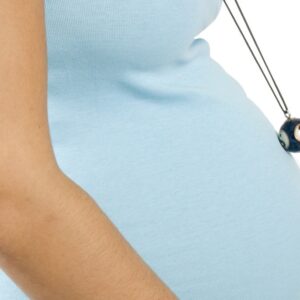When you are 19 weeks pregnant, your baby has developed a sweet tooth. If a sugar solution is injected into the womb, the baby will swallow twice as much of the amniotic fluid.
And how about you? Craving for something sweet or sour? Your cravings may predict the gender of your child according to an old wives’ tale. This article includes fetal development, pregnancy symptoms, the mom’s body, and a pregnancy diary.
Week 18 | Week 20
What to Expect When 19 Weeks Pregnant?
How Many Months is 19 Weeks Pregnant?
At 19 weeks pregnant, you are still in your second trimester and fifth month of pregnancy. You are almost half-way through your pregnancy journey.
As you know, pregnancy lasts 40 weeks or nine months. If counting pregnancy weeks and months and the logic behind it still confuse you, we prepared an article that explains it.
Your Baby’s Development
How Big is my Baby at 19 Weeks?
The fetal age of your baby is now 17 weeks. 19 weeks pregnant, your baby is now approximately 6 inches (15 cm) long head to bottom—the legs are so curled that crown to rump is the most common way of measuring a fetus at this point. Your baby now weighs around 8.5 ounces (240 grams). This week, the baby is the size of a mango.
For some mothers, this week will turn out to be the halfway mark of their pregnancy, although most women will carry their babies to term at 40 weeks or beyond!
An old wives’ tale is that the length of your pregnancy will correlate to that of your hubby’s mom’s pregnancy, while the length of your labor and childbirth will correlate with that of your own mom’s. So, have a chat with these two women!
 If you haven’t already, you might feel your baby’s first kick this week. These first movements might feel like fluttering or bubbling. Most women feel the first kicks between weeks 18 and 22. In second and subsequent pregnancies, it is possible to feel the kicks earlier than that. However, first-time moms might not feel the baby move until closer to 25 weeks, which is not unusual. Either way, you will soon be able to enjoy feeling your baby’s movements.
If you haven’t already, you might feel your baby’s first kick this week. These first movements might feel like fluttering or bubbling. Most women feel the first kicks between weeks 18 and 22. In second and subsequent pregnancies, it is possible to feel the kicks earlier than that. However, first-time moms might not feel the baby move until closer to 25 weeks, which is not unusual. Either way, you will soon be able to enjoy feeling your baby’s movements.
What Does my Baby Look Like at 19 Weeks Pregnant?
A cheese-like, thick, white layer, called vernix caseosa, is beginning to develop on your baby’s skin. Vernix caseosa has many important functions: it protects your baby’s skin from the amniotic fluid and moisturizes the skin, helps prevent infections, and helps your baby regulate the body temperature.
This protective layer disappears before birth. However, it is not unusual if traces of it (or even a bit more) are seen on the baby’s skin after delivery.
Arms and legs are now in proportion to the rest of the body. Your baby’s tiny teeth are forming.
The skin is still wrinkled. As the pregnancy progresses, more fat will be stored under your baby’s skin, which will give your baby a plumper look and smooth, soft skin.
Fetal development
Your baby’s external genitals are continuing to develop, and it is usually possible to tell the baby’s gender at this point. Doctors usually wait for a mid-pregnancy ultrasound, between 18-22 weeks, to determine whether you are carrying a boy or a girl. If you still haven’t found out the gender, and you would like to, your doctor will probably tell you at your next appointment.
Your baby will continue to grow and mature immensely in the coming weeks. All organs are in place, and their primary work is to mature to function outside the womb. Only a few weeks from now, your baby would stand a chance to survive if born. (Read about premature survival rates week by week here.)
The baby’s bones are beginning to harden, and the muscles are becoming stronger. All the better to kick and roll around inside!
The nerve cells for each of the senses: hearing, smelling, tasting, seeing, and touching are developing in their very own parts of the brain now, while other types of nerve cell production slow down as existing nerve cells grow larger and make more complex connections within the brain.
The specific development of the baby’s brain where the sensory control is formed is continuing to mature.
Your baby has already developed a sweet tooth! If sugar water is injected into the amniotic fluid, the baby drinks twice as much of the fluid as they would usually.
The kidneys start making urine.
Your baby is starting to produce meconium, the first tar-like bowel movement after birth (and will continue for the first few days of life).
Meconium is a normal part of the baby’s development. It is a build-up of ingested amniotic fluid and is excreted each day within the womb. It is typically greenish-black in color and takes on a tar-like appearance. Not easy to wash off your newborn!
If the baby passes meconium before delivery, it can be a sign of fetal distress. There is a slight risk that your baby will inhale the meconium during the delivery process (called meconium aspiration). If it gets into the baby’s lungs, it could create complications.
If this does happen, it won’t be until very close to your due date, and if the doctors suspect it or even see it because your water broke, labor is often induced. It is, however, not very common and certainly not something to worry about yet!
Mom’s Body
The Belly
 PinIf you lie down, you should be able to feel the top of your uterus right below your belly button when 19 weeks pregnant.
PinIf you lie down, you should be able to feel the top of your uterus right below your belly button when 19 weeks pregnant.
Your belly is growing, and your bump is most likely pretty noticeable at this point.
Don’t compare the size of your baby bump with other women in a similar pregnancy stage. All bodies are different, and every baby bump is unique.
Your linea nigra (the brown pregnancy line on your belly) may appear this week. Don’t worry, it disappears after your baby is born. Learn more about your post-pregnancy body here.
Pregnancy Symptoms
Do you crave something sweet and fatty or something sour?
Another old wives’ tale is that your cravings predict the gender of your baby. A mom expecting a boy will crave sweet and fatty foods, while the mom carrying a girl will want to eat sour foods.
You can read about more pregnancy myths here.
Round ligament pain is very common at this stage of pregnancy due to the increasing size of your abdomen. You may sense the pulling of the ligaments and some pain and aches.
Back pain is a common issue many pregnant women have to deal with. It happens because your body is adjusting to accommodate your growing baby, but also your muscles are doing hard work to support your growing bump and weight gain. Additionally, your joints and ligaments loosen and relax in preparation for the birth process.
Your balance may shift since your center of gravity is off, so be careful if you must walk up and down stairs or get up and down many times during the day.
You might start to experience leg cramps. Many women experience these shooting pains during the second and third trimesters. They might appear during the day, but you’ll feel them more at night.
There are various theories as to what causes leg cramps, but none of them are proven, so it is still pretty unknown what exactly causes them. You might try to relieve the discomfort by stretching before going to sleep or flexing your foot upward and back, and massaging the calves when they occur.
There are certain recommendations when it comes to the best sleeping positions in pregnancy. In the first trimester, it mostly doesn’t matter what position you’ll sleep in, but later on, it is advisable to sleep on your side, especially once you enter the third trimester. It is particularly advisable to try and sleep on your left side. This position allows for more nutrients and blood to reach the placenta and the baby. It also helps the kidneys to get rid of waste products and fluids from your body.
Heat rashes might occur due to an increase in body temperature and perspiration due to activity.
Some women might experience skin sensitivities at this point. They might notice dry, flaky skin or sensitivity to certain fabrics due to their abdomen stretching.
Using a moisturizer regularly to keep your skin moist and drinking fluids during the day will help alleviate these issues.
Some women find that regular use of cream or oil will help prevent stretch marks during the latter part of pregnancy, while others may use creams only to find that nothing will stop those beauty marks caused by carrying a child.
If you want to give your growing baby bump’s skin a treat, I can recommend getting yourself a nice tummy butter or other lotion. (My favorite is Burt’s Bees Mama Bee Belly Butter.) It can prevent dry skin, itching, and, who knows, maybe also stretch marks, although research isn’t too supportive of this possibility.
It is a truly wonderful product that smells good, works well even for sensitive skin, and makes your skin very soft.
Things to Do and Buy This Week
Have you started thinking about giving birth yet? Some moms start thinking about it early, and others don’t want to think about it at all!
Focusing on your baby’s upcoming birth and the many options available to you during delivery can be scary. While some choose to have a natural childbirth without medication, others who do not want to deal with extreme pain consider some pain relief methods.
Be sure to examine all of your options as nothing is written in stone when it comes to the big day. You’ll find many articles about giving birth here, including videos and birth stories provided by other moms.
Another thing – have you started your baby registry yet? Here is a list of great stores for baby registries to get you going.
Week 19 Pregnancy Video
Diary of a Daughter
What’s it really like being 19 weeks pregnant…? Here’s a true diary from a 19 weeks pregnant mom (Me..!)
This week I had an ultrasound and got a new due date. It was just adjusted a couple of days. Our baby is so beautiful and I also got to hear her/his heartbeat. Wonderful!
My stomach is growing fast and a few people have actually asked me if my baby is due around Christmas… Hmm, then I’ll be six months pregnant! But I haven’t gained all that much weight yet.
I had a small spotting two days ago. Very scary. But the ultrasound showed that everything is just fine. :-)
Are you also 19 weeks pregnant? Please share your experiences and thoughts by leaving a comment below!
Read Next About the Second Trimester
- Weight gain during pregnancy, what is normal and not
- See what your baby is up to in these fetal development videos
- Poll: How is your body changing during pregnancy?
Week 18 | Week 20
References:
Mayo Clinic, Mayo Clinic Guide to a Healthy Pregnancy
Joanne Stone MD and Keith Eddleman MD, The Pregnancy Bible: Your Complete Guide to Pregnancy and Early Parenthood
Nilsson, L; Hamberger, L. A Child Is Born
Soderberg, L., Mammapraktika. B Wahlstroms.
Meconium Aspiration Syndrome article
Image: Image of 19 weeks belly by Graham and Sheila

Paula Dennholt founded Easy Baby Life in 2006 and has been a passionate parenting and pregnancy writer since then. Her parenting approach and writing are based on studies in cognitive-behavioral models and therapy for children and her experience as a mother and stepmother. Life as a parent has convinced her of how crucial it is to put relationships before rules. She strongly believes in positive parenting and a science-based approach.
Paula cooperates with a team of pediatricians who assist in reviewing and writing articles.








